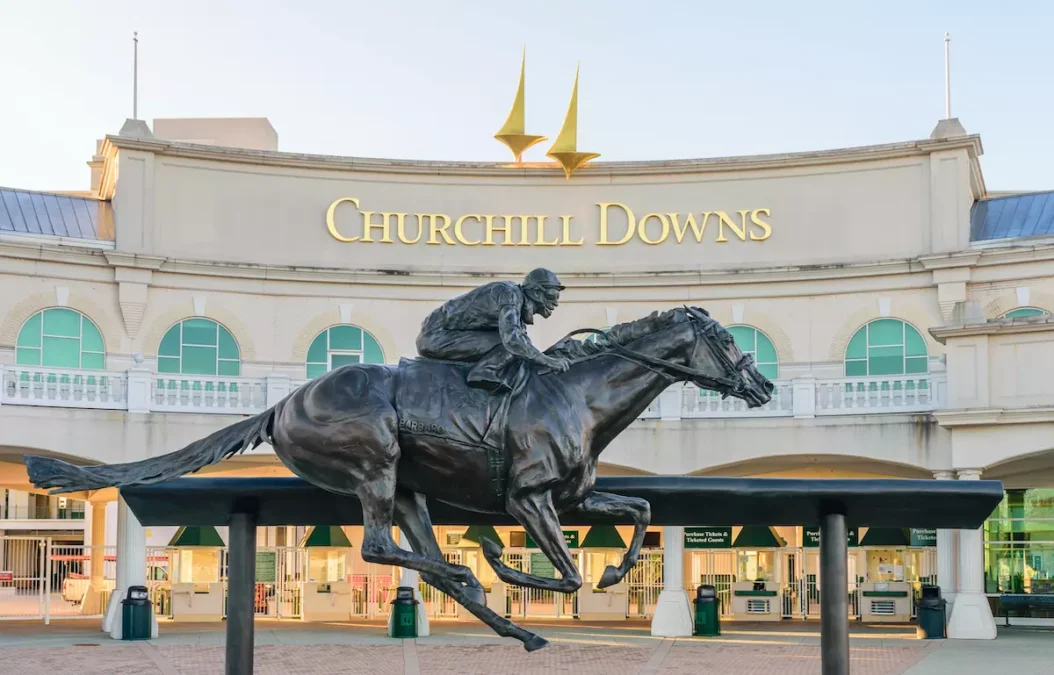The publicly traded company can continue with simulcasting to maintain a revenue stream while it pauses and probes why so many horses are dying at its track
Louisville, KY — Today, declaring that the “show must not go on with so many of athletes dying on the field of play,” Animal Wellness Action and the Center for a Humane Economy called on Churchill Downs to take an indefinite pause with its live-racing schedule until it can return to competition without more young, fit horses dying on the track.
The call for a temporary racing suspension comes after the unnerving and unacceptable drumbeat of horse deaths on the track there since racing resumed just weeks ago. At its major racing venue, Churchill Downs has been the stage for 12 horse deaths in a month’s time.

That rate of loss is higher than the rash of deaths at Santa Anita Park in 2019, when 42 horses died on the track, observed Animal Wellness Action.
“The current rate of loss of young, healthy, physically fit horses is not even close to acceptable, and Churchill Downs acknowledges that,” said Wayne Pacelle, president of Animal Wellness Action and the Center for a Humane Economy. “If the track keeps doing the same thing, it can expect the same result. The show cannot just go on, and the leadership of the track should hit the pause button for the well-being of the horses and of the industry itself.”
The shutdown of activities at Churchill Downs would apply only to live racing, not simulcasting of other races from tracks that have not experienced a surge in horse fatalities.
Recently, Animal Wellness Action called on leaders in the racing industry, and the new Horseracing Integrity and Safety Authority (HISA), to embrace the goal of “no young, healthy horses dying on tracks in training or competition,” with the new Authority to suspend trainers who put horses into competition and do not get off the track alive. Yesterday, the Authority and Churchill leaders announced a summit to examine the spate of horse deaths, with the new oversight body saying it is “deeply concerned by the unusually high number of equine fatalities at Churchill Downs over the last several weeks … .”
The sport’s new national governing body began implementation of a national race-day antidoping regulatory plan this month. That plan will bring long-needed uniformity to a patchwork system of regulatory control built around the work of 38 distinct state horse racing commissions. The Authority also has broad power to institute changes to improve horse safety at Thoroughbred tracks.
“As a Louisville resident, I value that Churchill Downs does immense things for our community,” said Joseph Grove, director of communications for Animal Wellness Action and the Center. “I’m pleased that track executives are taking some meaningful steps to triage the tragedies, but the only way to ensure no more horse deaths there until the investigations are complete is to suspend racing until causes are better understood.”
Congress has provided a mandate for protecting horses in American racing in enacting the Horseracing Integrity and Safety Act. Horse safety at the tracks should become the top priority for everyone involved in the business.
Animal Wellness Action has also called for a ban on the use of the whip in American racing, with its use perhaps pushing horses to run too hard and putting them at risk.
“If they keep running horses, Churchill Downs and the Authority are flying blind,” added Pacelle. “There are no easy answers or simple fixes, but the key stakeholders must look for causes in early-age racing, track surfaces, breeding of horses for speed rather than soundness, illegal doping, and insufficient screening of unfit horses slated for competition.”
